
Electrical Meters and Testers
Electrical testers are devices used for checking or quantifying electrical conditions. To measure the levels of electrical energy,
use an electrical meter. Elliott Electric Supply offers a variety of electrical meters and testers. This guide will
discuss the different types sold as well as electrical accessories.
Elliott Electric Supply offers a variety of electrical meters and testers. This guide will
discuss the different types sold as well as electrical accessories.
Digital Meters
AC or DC Clamp Meter
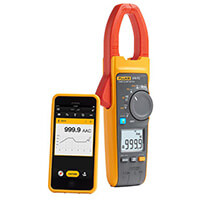
A clamp meter is an instrument which ″clamps″ around a live wire to measure its current. An AC clamp meter measures only the alternating current (AC),
whereas a DC clamp meter can measure both the alternating current and the direct current (DC).
Shop Clamp Meters
Digital Multimeter (DMM)
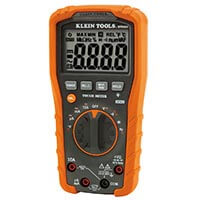
Digital multimeters are electrical instruments that measure quantities of voltage, current, and resistance. Typically this kind of device,
such as the Fluke Digital Multimeter, shows these values on a display screen.
A digital multimeter is able to measure resistance via injecting current into the circuit, then measuring the voltage drop. This is done with
Ohm's Law: V = I x R.
Shop Digital Multimeters
Voltage Meter
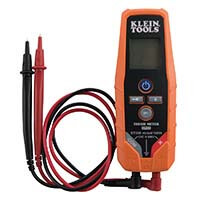
A voltage meter, or voltmeter measures the AC or DC voltage drop between to probes, and displays the volt reading on display.
Shop Voltage Meters
Digital Moisture Meter
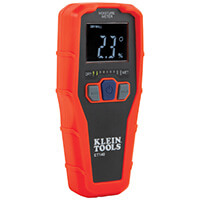
Because water conducts electricity, a digital moisture meter is designed to measure moisture levels present in various materials. Use a moisture
meter to safely detect the percentage of water to determine jobsite readiness, structural integrity, or resistivity and/or conductance.
Shop Mosisture Meters
Digital Light Meter
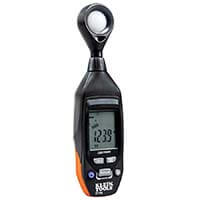
A digital light meter is used to measure the amount of visible light present in a specific area. Designed with a measuring unit
and separate meter, this device can measure light levels imperceptible to the human eye.
Shop Digital Light Meters
Thermometer
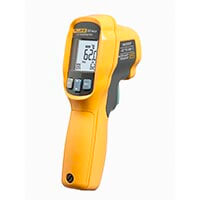
Probe thermometers measure temperature by touching a probe to the object. An infrared thermometer is a no
contact thermometer that measures temperature by collecting infrared light emitted by the object into the thermometer
and converting that infrared light into heat and a temperature reading.
Shop Thermometers
Testers
Outlet Tester (Circuit Tester or Receptacle Tester)
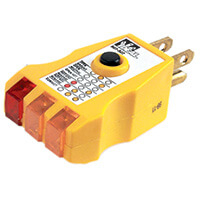
An outlet tester, circuit tester or receptacle tester, contains a 3‑prong power plug and three indicator lights; they detect whether wired electrical outlets or
campsite supplies are correctly wired. Outlet testers work by comparing the amount of current moving from one end of a circuit conductor to the next.
Shop Outlet Testers
Ground Fault Circuit Interrupter Tester (GFCI Outlet Tester)
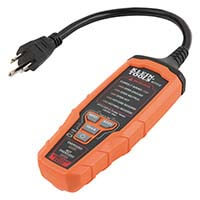
A GFCI Tester measures an electrical current from one end of a power source to the next. If these currents are not the same, this indicates a current leakage
and is dangerous. The main purpose of a GFCI tester is to reduce risk of electrical shock due to incorrectly‑wired GFCI electrical outlets.
Shop GFCI Testers
3 Phase Motor Rotation Indicator Tester
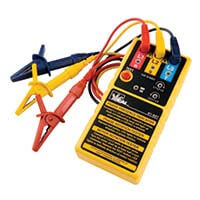
A 3 phase rotation indicator tester is designed to confirm rotational direction and identify leads in both an energized and disconnected
polyphase motor.
A non contact phase rotation meter can also identify the true phase sequence without touching the unit.
Shop 3 Phase Rotation Indicators
Continuity Tester
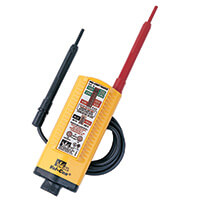
A continuity tester verifies the complete flow path in certain devices. A continuity symbol denotes a common terminal on low-resistance devices.
The electrical continuity test verifies signal path in single, 3-way, and 4-way switch terminals.
Shop Continuity Testers
Insulation Tester
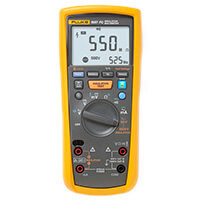
An insulation tester, also known as an insulation resistance tester, identifies damaged insulation and electrical current leakage by measuring the
resistance within electrical items with a high voltage, low current DC charge.
Shop Insulation Testers
Fluorescent Light Tester
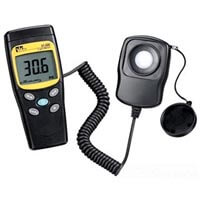
A fluorescent light tester is designed to quickly, easily, and accurately measure the output of fluorescent lamps and ballast.
Shop Fluorescent Light Testers
Cable Tester
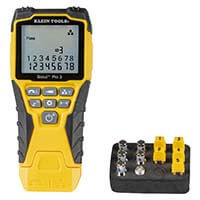
A cable tester is designed to test for open, short, miswire, split pair, or other networking issues with cables.
Shop Cable Testers
With locations across multiple states, Elliott Electric Supply understands
the electrical industry and your needs, unlike big-box retailers and e‑commerce corporations. Now, you can access our supplies and services more conveniently
using our mobile‑friendly website and through our updated
customer app.
From emergency lighting to electrical boxes, we've got your electrical needs covered. With great pricing, extensive inventory,
and fast delivery, you'll find no better wholesale electrical supplies distributor online than Elliott Electric Supply.
Shop online today!
Learn More About Our Other Products:
Warning: When using this information to perform electrical work, call a licensed electrician or consult the NEC® for safety. All
licensed electricians have passed examinations covering the National Electric Code®, know state and local building codes, and may carry insurance to cover damages.